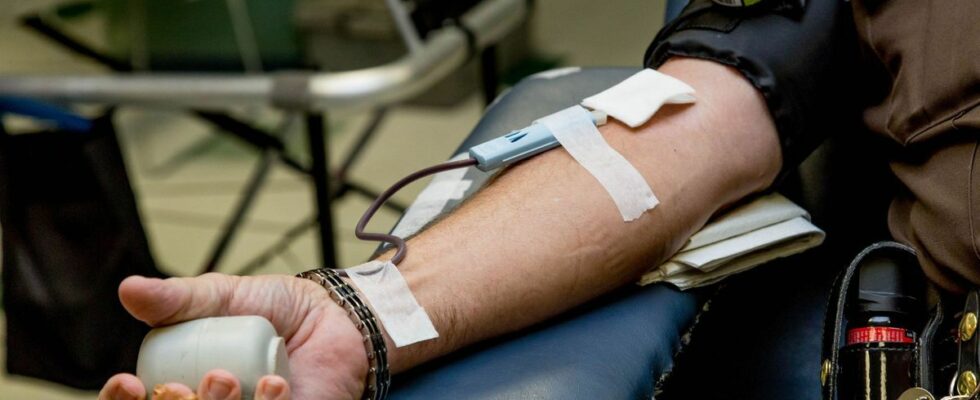Published on
Updated
Reading 3 min.
Young people are those who, within the French population, donate blood the most. But only a minority of them do it regularly. Retaining them is one of the challenges to overcome for France to maintain its reserves.
Today, 30% of donors are under 30 years old, while this age group represents 21% of the adult population of donor age (18 to 70 years old).
It is among those aged 18-24 that we find, proportionally, the greatest number of donors, assures‘French blood establishment (EFS) – you can give from 18 years old.
But the practice of donating blood then declines rapidly with age. There are therefore half as many blood donors aged 25 as 19 years old.
“Our role is to ensure self-sufficiency in labile blood products“, that is to say from a blood donation and intended to be transfused into a patient, reminds AFP the president of the EFS, Frédéric Pacoud. This represents “around 10,000 daily donations”.
For this, the EFS, the public blood service in France, must “retain its donor base and constantly recruit new ones“, he continues.
Gold, “it is undoubtedly more complex today to retain young people than it was ten years ago“, observes Jacques Allegra, president of the French Federation of Volunteer Blood Donors.
Impact of the health crisis
“Their geographic mobility is greater, it is more difficult to establish habits among this population“, he explains. “We have a lot of young people who come to give once and then never come back.“.
High schools and higher education establishments naturally appear to be the preferred places for young people to donate blood.
But, in recent years, the number of new donors recruited during these collections has declined sharply. The health crisis born from Covid has in fact led to this type of collections being divided by almost three in 2020 and 2021, which has weighed on the number of new donors.
However, it is within higher education establishments that awareness raising seems most effective, according to Tanguy Monfort. This 21-year-old volunteer with the “Eurotandem” association travels across France in tandem to encourage the population to donate blood.
“This year, it was on campus that a maximum of appointments were made in a minimum of time“, describes this student at an engineering school in Douai (North). “The most receptive are young people, but we often have to reassure and inform them: some think that they cannot give because they smoke, or that their blood will not be renewed“, he says.
And if they are easily convinced, they won’t necessarily come back.
Ecology and inclusion
“We often donate for the first time for extrinsic reasons: because we come from a family of donors, or because donating is experienced as a positive experience at 18, like being able to vote.“, deciphers Bruno Danic, director of EFS Bretagne, who has worked on the sociology of giving.
“For the +novelty+ effect to be perpetuated over time, it is necessary to create intrinsic motivation, which is very personal.“, he continues.
To overcome the obstacle of geographical mobility, the EFS no longer communicates by mail but by email or SMS.
It has also significantly increased its presence on social networks in recent years, calling on influencers to promote the cause.
“We must be in tune with society, with the expectations of young people“, underlines Frédéric Pacoud. The younger generations therefore attach particular importance to certain subjects, such as ecology.
To respond to this, the EFS intends to gradually eliminate plastic bottles, during snacks after donations, or offer foods that are more respectful of short circuits.
“Young people are also much more attentive to ensuring that all donors are welcomed without discrimination based on origins or sexual orientation.“, notes the president of the EFS who, in this matter, aims for exemplarity.
